Is Guinea really turning the page for press freedom?
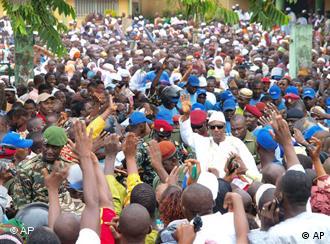
Can Alpha Condé live up to the high expectations?
Sekou Touré, Lansana Conté, Dadis Camara – Guinea has seen only three presidents in more than 50 years of independence. None of them has governed the country in a democratic way. Moreover, freedom of the press is still far from reality for the country’s journalists.
In 2010, Guinea finally went through democratic elections. So, what’s the state of press freedom in the country’s new democratic era?
Reporters without Borders looked at the current media situation in Guinea as well as in Niger – another country undergoing a transition. Turning the page is the optimistic title of their report, but the media watch dog organization has also labelled press restrictions issued by authorities on July 26 as censorship. Following an attempted attack on Guinea’s President Alpha Condé, the National Communication Council, banned all media from mentioning the attack. 72 hours later it lifted the ban.
![]() read more
read more
Est-ce que la Guinée tourne une page pour la liberté de la presse?
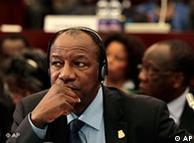
Le président Alpha Condé
La levée de ces restrictions est-elle une victoire pour la liberté de la presse en Guinée? Ecoutez la réponse d’Ambroise Pierre.
Interview: Bob Barry
La lutte sénégalaise et les pêcheurs traditionnels – Histoires Africaines à Dakar
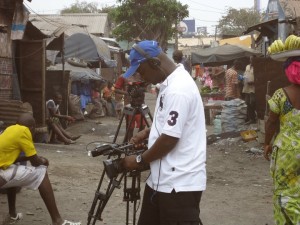 Que peut-on faire de beau à partir de déchets plastiques ? Quel est le sport-roi du Sénégal ? Comment vivent les pêcheurs sénégalais ? Si vous voulez des réponses à toutes ces questions, regardez les films que les participants de l’atelier “Histoires africaines – Reportages TV” (African Stories – read more in English) ont réalisé à Dakar.
Que peut-on faire de beau à partir de déchets plastiques ? Quel est le sport-roi du Sénégal ? Comment vivent les pêcheurs sénégalais ? Si vous voulez des réponses à toutes ces questions, regardez les films que les participants de l’atelier “Histoires africaines – Reportages TV” (African Stories – read more in English) ont réalisé à Dakar.
Neuf participants venant de la Guinée Conakry et du Sénégal ont travaillé dur pendant deux semaines au mois de juillet. Ils ont supporté la chaleur, la pluie mais aussi les méthodes allemandes de travail, notamment pour ce qui concerne le visionnement minutieux des rushs.
L’atelier a eu lieu au sein du CESTI (Centre d’Études des Sciences et Techniques de l’Information) à Dakar au Sénégal. Cela a représenté deux semaines intensives d’échange, de défis mais aussi de plaisir.
![]() read more
read more
The herculean task of reporting elections in post-conflict Liberia
Liberia is set to head to the polls this fall. It’s the second time Liberians will vote in general and presidential elections since the end of the civil wars that devastated the country from the late 80’s until 2003 and left hundreds of thousands dead.
Liberian media is still very weak, and the post-election violence in neighbouring Ivory Coast is a stark reminder of how much is at stake in fragile democracies.
As Liberia’s Press Union President, Peter Quaqua, wrote recently: “the media in Liberia has the herculean task of reporting the processes related to these elections in the most responsible, ethical and professional manner. How well we report the news will definitely determine the public’s response to issues arising from the polls.”
Moreover, Quaqua urged journalists to do the right thing by the public and not to surrender their agenda setting responsibility to politicians.
For more insight into Liberia’s media in the run up to the elections we spoke to Peter Quaqua at the recent Global Media Forum.
Interview by Barbara Gruber
Asian media execs brush up their leadership skills in Bonn
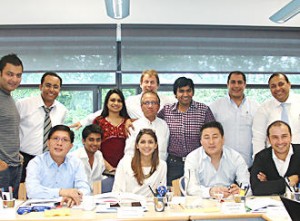 “Change management” was the catchphrase for 13 media managers from eight North African and Asian countries who attended a management training workshop in Bonn this summer. The participants discussed ways to organize transition at their respective stations. By using techniques like role play, they practiced communicating their decisions in a professional way. The training also highlighted cooperation and conflict in teams, group dynamics and key aspects of human resource development.
“Change management” was the catchphrase for 13 media managers from eight North African and Asian countries who attended a management training workshop in Bonn this summer. The participants discussed ways to organize transition at their respective stations. By using techniques like role play, they practiced communicating their decisions in a professional way. The training also highlighted cooperation and conflict in teams, group dynamics and key aspects of human resource development.
The Asian participants came from Bangladesh, Pakistan, Philippines and Mongolia. Besides visiting DW’s facilities and attending the Deutsche Welle Global Media conference ahead of the workshop, their action-packed schedule included a visit to German public broadcaster WDR in Cologne. A lively exchange with that station’s director of human resources topped off the week.
In this video, project manager Patrick Benning takes us inside the week-long workshop that was taught by DW-AKADEMIE trainer Achim Toennes. Participants Sarmad Palijo of Pakistan and Mat Verano Pareja of the Philippines describe their impressions of the visit to Germany.
Shedding light on the dark side of labor migration in Asia
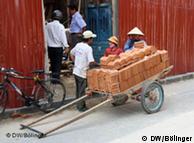 There are about 80 million migrant workers worldwide. We often hear that they have a positive impact on the global economy. For instance, 12% of Bangladesh’s Gross Domestic Product (GDP) is generated by citizens who work abroad in countries such as Bahrain, Saudi Arabia and Malaysia.
There are about 80 million migrant workers worldwide. We often hear that they have a positive impact on the global economy. For instance, 12% of Bangladesh’s Gross Domestic Product (GDP) is generated by citizens who work abroad in countries such as Bahrain, Saudi Arabia and Malaysia.
But researchers like Kalinga Seneviratne say that labor migration from Asia has many hidden problems.
Mr. Seneviratne is the head of research at the Asian Media Information and Communication Centre (AMIC) based in Singapore.
At the Deutsche Welle Global Media Forum in Bonn this summer, Kalinga Seneviratne and other experts discussed how the media can tackle issues pertaining to labor migration.
Talking to Deutsche Welle reporters, the award-winning journalist explains some of the problems migrant workers face, the challenges journalists encounter when reporting such stories and how the media can play a major role in promoting human rights.
Interview with Kalinga Seneviratne
![]() read more
read more
Freedom Fone: dialing community media
As mobile phones become more sophisticated, it’s easy to overlook the simplicity, and yet the power, of the most basic type of handset that offers voice calls and text short message service (SMS) for communication.
It’s those basic services that Zimbabwe’s Kubatana Trust had in mind when they developed Freedom Fone to reach communities and audiences that do not have access to the Internet, and where literacy or language presents a barrier to gaining information.
From their website Freedom Fone is described as:
“…easy to build interactive, two way, phone based information services using interactive audio voice menus, voice messages, SMS and polls.”
Importantly, Freedom Fone is developed to be independent of the internet, both for the content provider and the end user.
Farmers in remote areas could for instance call an agriculture information service hosted on the Freedom Fone platform; navigate the interactive voice menu with the phone keypad (say, press 2 for market prices) and listen to the information they need. Or, radio stations could gather audio reports from listeners as voice mail messages or receive SMS answers – making another form of local community media available.
At the recent Global Media Forum in Bonn, Freedom Fone’s Co-Founder and Technical Director, Brenda Burrell, gave a couple presentations of the platform.
One audio example she played particularly stood out – so called “micro audio dramas”: broadcast as a series of short audio clips that people could call a service and listen to on their phone.
Freedom Fone micro drama example by DW Akademie – Africa
Burrell says educational micro dramas were among the most successful of the pilot projects using Freedom Fone.
For international media development agencies, innovative community media projects such as Freedom Fone, CGnet Swara in India, Voices of Africa and NT Mojos in Northern Australia, should also be good motivation to develop specific training programmes to produce audio and video content using mobile phones, or for “broadcast” via mobile phones.
PBS Media Shift’s Idea Lab has a good post profiling Freedom Fone and Mobile Active offers some very interesting insight on using Freedom Fone in the field with Farm Radio in Ghana and Tanzania.
From the Global Media Forum, have a listen to Brenda Burrell explaining more about the development of Freedom Fone, and you also can follow her on Audioboo.
Freedom Fone Brenda Burrell DW-GMF 2011 by DW Akademie – Africa
Author: Guy Degen
Producing compelling African stories
Turn around and you will find a story to tell. That’s what DW-Akademie’s new journalism training project African Stories is all about: African journalists telling African stories and taking a closer look at their society.
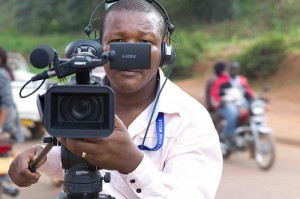 In short, the project aims to train journalists to produce interesting and professionally produced TV reports and documentaries – offering their audience an African perspective on a number of issues ranging from environmental protection, economic development and governance to poverty reduction, health and education.
In short, the project aims to train journalists to produce interesting and professionally produced TV reports and documentaries – offering their audience an African perspective on a number of issues ranging from environmental protection, economic development and governance to poverty reduction, health and education.
African Stories is also ambitious in scale involving broadcasters from across the continent. Television stations participating in the project send a production team to attend a two-week training course. The reports produced by each team during the training are in turn made available to all of the participating broadcasters.
To give you a better idea of the project, here are some stories produced during the recent workshop in Kampala in June.
![]() read more
read more
Creating Asian guidelines for user-generated content
The Asian tsunami of 2004 and the Japanese earthquake and tsunami this year were two occasions where broadcasters around the globe relied heavily on user-generated content (UGC). They aired videos people had taken with their mobile phones, pictures snapped with digital pocket cameras or they simply broadcast information users had sent in via e-mail or as text messages from remote places.
These days, many radio and TV stations encourage their audiences to contribute material to their broadcasts. This gives them access to footage professional crews couldn’t otherwise get – or couldn’t get that quickly. And it gives the audience a voice, creating a two-way conversation with the broadcasters and making people feel like the broadcaster is there for them, picking up their stories and addressing their concerns.
Making the most of user-generated content
But how can broadcasters safeguard the quality and suitability of such content? After all, it’s supplied by regular listeners or viewers: amateurs, not trained journalists. Citizen reporters haven’t necessarily been taught the journalistic basics every professional has learned, like how to research facts, how to report accurately and how to be fair to all sides.
![]() read more
read more
Young Media Summit in Tunis: Call for Applications
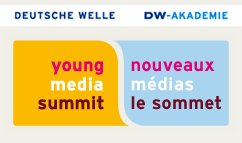 Are you a blogger, Internet activist or a freelance online-journalist from Tunisia, Morocco, Algeria, Libya or Mauritania? Would you like to participate in a forum to exchange views on the political situation in the region, the role of social media, quality standards in online-reporting, the economic potential of blogging and start a network with your fellow bloggers? If the answer is yes, then consider applying for the DW-Akademie Young Media Summit in Tunis, 28 – 30 November 2011.
Are you a blogger, Internet activist or a freelance online-journalist from Tunisia, Morocco, Algeria, Libya or Mauritania? Would you like to participate in a forum to exchange views on the political situation in the region, the role of social media, quality standards in online-reporting, the economic potential of blogging and start a network with your fellow bloggers? If the answer is yes, then consider applying for the DW-Akademie Young Media Summit in Tunis, 28 – 30 November 2011.
The DW-Akademie will bring together 30 bloggers to discuss social media in North Africa. DW-Akademie will cover travel-expenses and accommodation for invited delegates.
To apply, please submit your CV and the link to your blog or website to dwa.africa@gmail.com. Applications close on August 7, 2011.
We are looking forward to hearing from you!
The DW-AKADEMIE is the media development, media consulting and professional journalism training division of Deutsche Welle – Germany’s international broadcaster. It offers partners and clients worldwide a broad spectrum of training and consulting services.




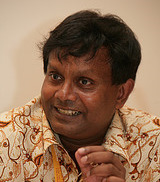

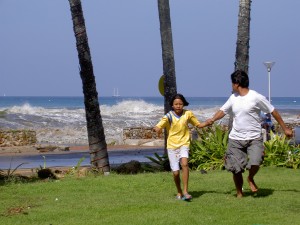




Feedback